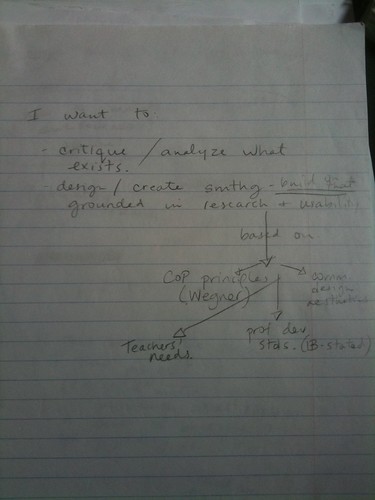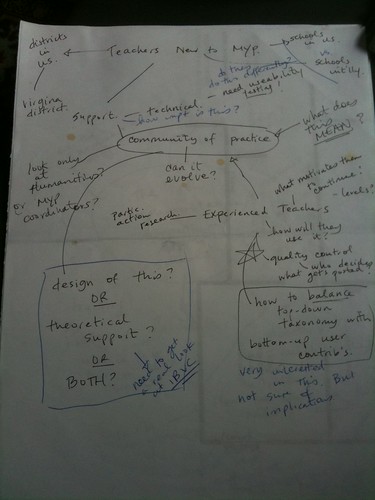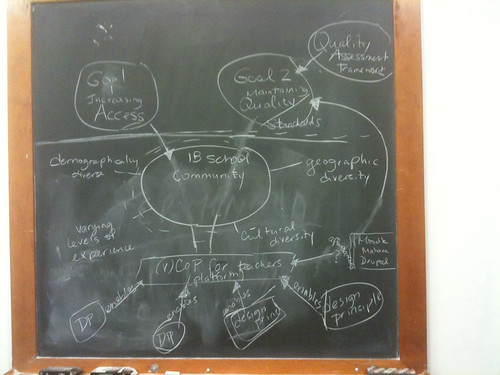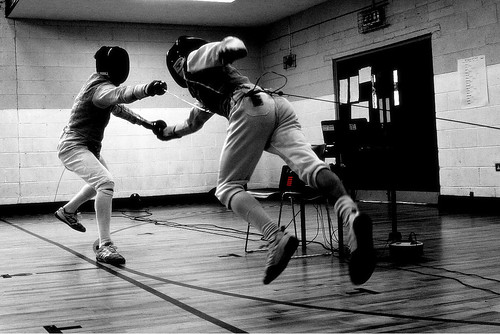I began this post about a week ago, and have been coming back to it from time to time over the last few days. At this very moment, I’m sitting at Newark Liberty Airport, Terminal C, with a significant wait ahead of me before boarding a flight to London for a job fair for international schools. It seems as good a time as any to finish up this post…
… which is long overdue, but really, the truth is that I needed a break.
When I wrote my last post, I really did feel as though I would be excited about finishing my thesis document and I would post a big long reflection here about what I learned and blahblahblah. But I found that as soon as I was done — and I mean literally, THE MOMENT I handed it in, I was finished with it. I just breathed a giant sigh of relief. I mean, I did speak about it with people after it was handed in, of course. And I have spoken about it several times since then. But not once have I wanted to re-hash it, re-open it, explore a new side of it, or re-examine it. A few weeks ago I had to open the 86-page document, as I had promised several colleagues I would send them chunks of it — different chunks for different people, as it turned out. Just the process of having to split sections and review it in its massive coherent form, made me realize that I was so not ready to get back into any kind of academic mode any time soon. I still very much feel that way, but I know I need to look back on all of this while it’s still tastable in my memory, before it disappears… and while I still have time on my hands (more on that in a later post).
Firstly, the logistical stuff: I *will* post my thesis in its entirety on my main site as soon as I can. By “in its entirety” I mean that monstrous document. I also mean the slide presentation I gave on December 10th, accompanied (hopefully) by the audio of my presentation. I’m still waiting on the official video which has the quality audio, and hopefully once I have that I can put it all together. It’s on my to-do list.
In the meantime, I’ll give you a brief overview of what my thesis was about. Actually, perhaps the best way for me to do that is to post the abstract here (hyperlinks added, of course):
Bridge to Success is an online learning environment for International Baccalaureate teachers in the Middle Years Programme, and was developed as part of a Gates-funded access initiative to International Baccalaureate programmes. This paper firstly aims to examine fundamental concepts of community of practice theory and research and the evolving new area of virtual community of practice research, in order to determine if a community of practice approach is the best fit for the current Bridge to Success environment. Further, this paper examines whether design principles can be derived from community of practice research, and subsequently applied to the mindful design of an online learning environment. This paper concludes that community of practice research can provide a sound theoretical framework to the design of an online learning environment, specifically by way of providing a social context, distributed cognition, and wisdom of the periphery. Design recommendations to promote user activity and participation are suggested and illustrated.
So there you have it, in a nutshell. I took an existing online learning space for teachers — in this case, for IB teachers of MYP, a curriculum framework I’m very experienced in and feel strongly about — and applied Communities of Practice (CoP) research to the space, with the idea that design recommendations could be made to better facilitate learning.
And… in terms of reflecting on all of that… wowza… where does one begin? I guess I’ll start with content — also known as All That Stuff I Read And Then Analyzed And Wrote About. But this leads very naturally into my process, and how it all developed. Well, here goes…
I can’t even remember how I became interested in Communities of Practice theory (CoP theory). I know I had to read some Lave & Wenger in my first Cognitive Science course in Fall 2009, so it probably crossed my radar then. However, I can’t recall how I became interested in it so much as to do an entire thesis on it. Perhaps it will come to me later, or one of my NYU colleagues/classmates remembers having a conversation with me when I confessed my desire to dig deeper into CoP. All I know is that once I discovered it, I just wanted know more and more about it — that’s the sign of something thesis-worthy, I suppose. However, the way my thesis came about was more serendipitous than just a single interest and subsequent exploration.
It began last spring when I wrote a theory paper for a course on Architecture of Learning Environments. The paper could take whatever form I wanted it to, and Dr. Ricki Goldman gave us free reign in terms of applying course concepts to something that was in our realm of experience or knowledge. I decided to apply it to the theoretical design of an online professional learning space for MYP teachers, building on the core philosophies and tenets of the International Baccalaureate in general. The paper was fine — I did my research — but it was just a theory paper. It was the kind of theory paper I affectionately call, “Just a Nice Idea.” And so, that Nice Idea sat around, as nice ideas are wont to do.
Over the summer, I took a course titled Leadership for School Improvement, taught by Dr. Gary Anderson. The course was fascinating to me on many levels, not least of which was that it gave me insight into different school models here in the USA. (If you know anything about me, you know I have much more to say about this, but am refraining here.) In that course, we looked at many different leadership approaches, models, and practices as fit different school types, models, and situations. Most of the people in this course were interested in becoming future administrators, I believe. I am not. However, I am interested in becoming a better instructional leader. I know I have much to learn, and this course was just an appetizer.
Dr. Anderson filled the syllabus with very relevant readings, videos, and websites. I learned from every one of them. But one of the readings in particular really sparked my interest. It was a book chapter written by Dr. Anderson himself, with J. Blase, and it was about leadership and micropolitics (if you are interested, it is taken from this text: Blase, J., & Anderson, G. (1995). The Micropolitics of educational leadership: From control to empowerment. New York, NY: Teachers College Press). As I read about micropolitics, I wondered how it translated to teachers’ and admin’s feelings in online spaces, as opposed to purely physical ones. Did the same rules apply? Not only was I surprised to discover I was even remotely interested in reading about micropolitics in professional relationships (that’s for you, Jon), but also that I was thinking about the design implications of this — could a professional development space be designed so as to minimize the negative micropolitics in professional relationships, but capitalize on the positive ones?
I expressed my interest to Dr. Anderson after class one day — truthfully, I was looking for the full reference list of the chapter he had assigned to us. He confessed that he didn’t have it on him and suggested I look for the book itself in the library (I did find it there, and kept it for the next 6 months!). He also asked why I was interested, as it was such an “old” book (1995!) and seemed less relevant than other things we were reading about. I told him a bit about my background and interests. Upon hearing that I had experience in IB, he asked if I had read any of Leslie Siskin’s studies. I admitted that I had not. Later that day, Dr. Anderson sent an email of introduction to both me and Dr. Siskin, and I did a few searches to find out more about her work. I was pleasantly surprised to find that Dr. Siskin’s recent work had been looking at the IBMYP and DP as reform approaches in Title-I eligible schools nationwide. I read all the reports (yes, all of them!) and arranged a meeting with her. What I was most interested in: how did teachers new to MYP feel about the professional development they received? What made it good/bad? What could have made it better? How did they feel it impacted their teaching practice?
My chat with Dr. Siskin was fantastic — she was eager to listen to my questions and answer as best she could, and she was also eager to hear about my now-forming idea for a thesis project. At the time, I don’t know that I had any idea how it was going to come about, but I had an inkling that I wanted to design some kind of online space for MYP teachers to learn, grow, develop, and become better teachers. I talked with Dr. Siskin about the existing space for MYP teachers to (theoretically) do this — the IB’s Online Curriculum Centre (OCC). We agreed, and her ethnographic data confirmed, that the OCC sucks. Badly. Really badly.
I took Dr. Siskin’s advice and sat, brainstorming, in several different locations with nothing more than blank paper, a pen, a pencil, and a glass of wine/cup of coffee. I mapped out — literally — different paths my interests could take me. I did this on three or four different occasions, and ended up with 4 or 5 pages of mind-maps, with notes.
It didn’t happen overnight — rather, I think it took about three weeks — but eventually, my thesis began to take shape. I continued to explore the reasons why I felt the OCC was missing out on some amazing potential; there was a void there I desperately wanted to fill. I kept coming back to communities of practice and situated learning, and felt strongly this social learning theory would be a great base for teachers’ continued professional development, particularly considering MYP teachers are geographically separated. I thought back to when I was in Qatar and Hanoi, without access to other MYP teachers outside of those within my own school, and how often I wanted to know, “What are other schools doing? How are they handling [fill in the blank issue here]?” Given that the OCC failed miserably in this respect, I found my answers to those questions via Web 2.0 social media like Twitter and blogging. But I couldn’t help but think that if the IB got on board and cultivated the community itself, that teachers would flock to it, and use it purposefully.
In the early stages, I had the idea to design this professional space for MYP teachers myself. I thought I would look at what existed currently (the OCC and the new IB Virtual Community), do the relevant theoretical research, look at some similar non-IB online spaces for teachers, and design incorporating what I found. However, my plans found several roadblocks, the most significant of which was that the administration behind the OCC denied me access for research purposes. I went through all appropriate channels, but the staff at the OCC were adamant in that access was only to be given to teachers currently in IB schools, and given that I was a full-time Masters student, and not currently teaching, the answer was a firm, “No.” And so that door closed.
In my efforts to find a way to open it, I approached every MYP guru I’ve ever known — past and present mentors, colleagues, administrators, curriculum coordinators, and more. (You know who you are! Thank you!) People were incredibly helpful, offering me what they could, but it wasn’t enough. A few people offered to give me their sign-on details just to have a look around, but I felt strongly that I couldn’t ethically publish my work if I had gained access through the back door.
One of the people I contacted was Tim Cunningham, instructional designer and director of development at Triple A Learning. Tim and I know each other from the time we spent at Qatar Academy. In fact, Tim hired me to work there; I came on board as one of few MYP-experienced teachers in 2003. Tim had since gone into the direction of professional development provider, firmly rooted in both MYP and DP. He shared with me that Triple A was at the moment working on an online space similar to what I was suggesting; a pilot project with IB Americas was emerging whereby several Title I-eligible schools in the USA were implementing MYP and DP as part of an access project. Tim told me he would talk to the relevant people involved with the project to see if I could be involved.
Before I knew it, we were up and running. IB Americas and Triple A were happy to have me talk to them, examine their space, pore over their documents, and generally prod around here and there so that I could apply CoP theory to their space by way of design recommendations. Tim in particular was quite excited, which was great because I was even more excited! And off I went…
I don’t think I want to go into too many details about the scope or range of the project itself; that will all be obvious enough once my thesis and relevant media are uploaded for those interested to see. However, I do think it’s useful for me to reflect on what I learned. I’m narrowing it down here to my ten big takeaways / surprises / a-ha moments. In no particular order:
- I had no idea that writing a thesis would involve so much uninterrupted time to simply sit and THINK. After reading, reading, reading, and making heaps of notes, I often found myself with the need to just sit and think, to process. I often wasn’t “doing” anything — but the wheels, they were a-turnin’. Sometimes for an hour or two at a time. I am pretty certain that I’ve never done that kind of intense, academic thinking before. I simultaneously loved and hated it.
- I learned way more about the library than I ever wanted to. Seriously, if you ever need to study at NYU’s Bobst Library, speak to me first. I can tell you which floor has the most / least undergrads, the best water fountains, cleanest bathrooms, fastest Wi-Fi connections, and cleanest tables.
- There are a remarkable number of organizations across various industries applying CoP theory to their employees’ learning, but not nearly enough. Perhaps the biggest surprise for me was finding that the US Air Force uses CoP theory and does so brilliantly. (If you’re curious, contact me and I’ll send you details.)
- Sometimes, it is simply easier to design something from scratch than it is to redesign or add on to what is currently there.
- The IB is, IMO, one of the most progressive educational models out there, and this is why I support all three programmes. However, they still have a long way to go in some respects, particularly in the areas of applying and implementing technology, especially into teachers’ learning. Also, as I make the case in my project paper, the IB would do well to open up their professional development with the rest of the world. They are only just now beginning to open up the educational model more, increasing access, etc., but I think all on both sides of the “IB divide” would have much to benefit from some sharing with non-IB educator folk. Let’s start bridging!
- Instructional design does not happen in the real world the way most of my professors said it would. 🙂 I knew this already, but I really, really had to say it again. I mean no disrespect to my professors, but I would like to have seen some real-life project management infused into much of the academic fluff we looked at in terms of instructional design models.
- I was very saddened to discover how many vCoPs (virtual communities of practice) had been begun for research purposes, or even practical ones, but then died out after a couple of years due to lost funding or poor management.
- Intense, sustained writing requires a lot of food and drink. A LOT.
- The two apps I fell in love with while working on my thesis were Keynote and Scrivener. To be fair, I was already in love with Keynote, but the more I tried to use other software, the more I realized how much I love Keynote, because I feel like it does everything. And makes it look slick, too! Scrivener took me a bit of convincing, but really not a heck of a lot. The people at Literature and Latte do a great job with tutorials and online help, making it super clear how to do various things. They are also marvellous with customer service, responding to me via Twitter an email, often within 24 hours. It’s one app I did not hesitate to pay the bucks for — and it’s not expensive if you are a student! Really, really love it.
- I am capable of even more than I thought I was. And this continues to astound me. If you had told me in Sept 2009 what I would have been writing my thesis about, and what form / shape it would take, I would have had a hard time believing you. My intentions for study were so different when I entered the ECT program than they were when I began my thesis — testament, I think, to how much I learned during my time at NYU. I began wanting to explore literacy via technology with middle schoolers, particularly the writing process — an area, I’ll add, that I’m still interested in! However, I became so interested in so many other things, primarily teachers themselves, that eventually I found myself feeling like they needed more tech support and literacy to do their jobs best. And… here I am.
The thesis is over, but the learning is not.








